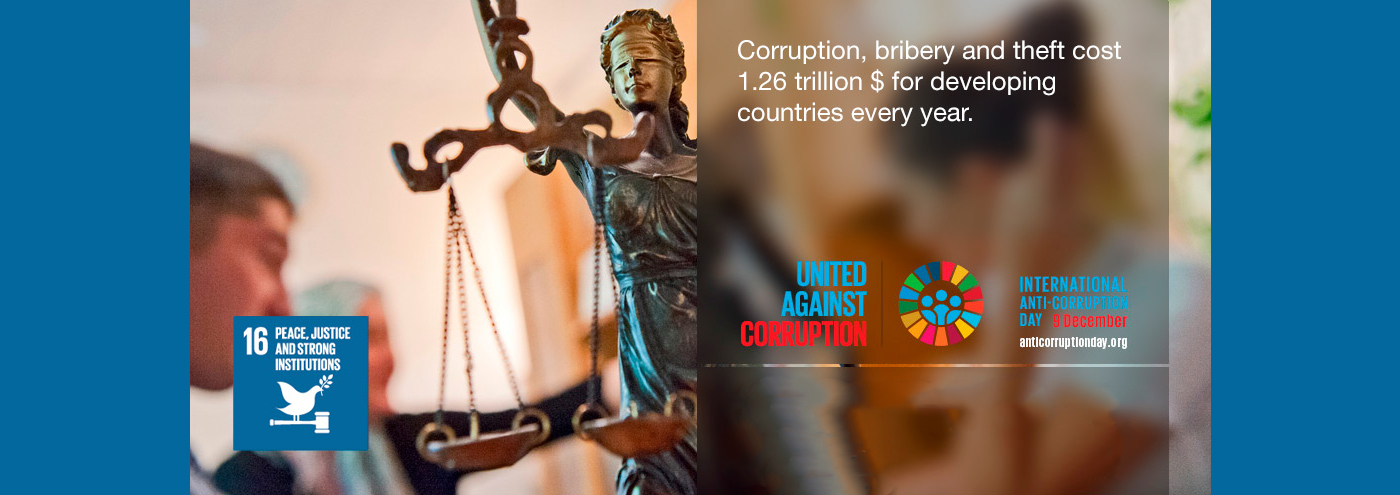December 9 is International Anti-Corruption Day (IACD) and this year, the United Nations Development Programme (UNDP) and United Nations Office on Drugs and Crime (UNODC) are leading an international campaign highlighting corruption as one of the biggest impediments to achieving the Sustainable Development Goals (SDGs).
The SDGs are 17 interconnected goals launched in January 2016 as part of the 2030 agenda to end poverty, protect the planet and ensure that all people enjoy peace and prosperity. The SDGs apply to everyone – from individuals to industry to government. The 2018 IACD campaign highlights the importance of tackling corruption in order to achieve the SDGs.
Corruption is described as a serious crime that can undermine social and economic development in all societies. No country, including Australia, is immune to corruption. It is found in both wealthy and poor countries. It affects education, health, justice, democracy, prosperity and development, key elements of the SDGs and is known to disproportionately impact the poor.
In March this year, CourtHeath reported on the federal opposition’s policy to introduce a national integrity commissioner responsible for the prevention, investigation and elimination of corruption inside the federal government and public sector in Australia. The commission would be in addition to state-based commissions that already exist and have oversight of state and local government matters.
With the prospect of a federal election looming in the first half of 2019, support both in and out of parliament has grown for the initiative. Last month, opposition leader, Bill Shorten called for bi-partisan support for the commission noting in a letter to the Prime Minister, Scott Morrison, that “the public’s attitude towards politics and politicians is at an all-time low.” The cross-bench has also been active recently in considering the issue with Independent Senator Cathy McGowan proposing a bill that would introduce a code of conduct and a parliamentary standards commissioner with the power to refer individuals to the National Integrity Commissioner.
The PM called this a “fringe issue” even though a proposal to introduce a national integrity commission is understood to have been the subject of cabinet discussions for at least six months.
Shorten and McGowan have both declared that there is significant public support for the initiative, a view also supported by 32 former judges in a letter coordinated by the Australia Institute to the PM stating:
“Governments ignore at their peril demands by citizens to combat corruption with vigour…We urge you to immediately establish a strong, effective and independent national integrity commission.”
Media support for the proposal is also building with Tony Walker declaring in an opinion piece for The Age: “No, Prime Minister, an integrity commission is not a fringe issue.”
Academics are also offering politicians advice about the proposed commission that’s not, according to Griffith University’s Professor AJ Brown a “matter of simply stitching together what’s there and hoping it will work any better.” Instead, said Brown, who also sits on the board of Transparency International, “What’s needed is to plug the gaps and that includes having a new national integrity commission which can do more than simply just hunt corruption, but it can actually build integrity and deal with whistle-blower protection, deal with parliamentary standards and some of the other big gaps in the system.”
The call to build a culture of integrity in Australia’s public sector was echoed in the Joint communiqué: United against corruption issued on 7 December, where the Commissioners of Australia’s independent, anti-corruption and law enforcement integrity agencies collectively called on “public sector leaders to do more to build strong cultures of integrity that resist corruption.”
“Building strong cultures of integrity is the single most significant action our public sector leaders at all levels can take to address corruption,” the leaders stated the communiqué.
“Much has been achieved in our public sectors to identify and address corruption risks and there are some notable achievements being championed by many public sector leaders. However, the recent work of our eight agencies clearly shows there is some way to go before we can comfortably say we have public sectors that are truly corruption resistant.”
Increased accountability and transparency of Federal public officials and elected representatives would help level the playing field in the broader public sector providing a strong deterrent for corrupt activities that are an impediment to the SDGs – however, it remains to be seen what and when any new requirements will be put in place.
We at CourtHeath will watch with interest and remain #UnitedAgainstCorruption
* * *
IMAGE: #UnitedAgainstCorruption
* * *
A participant in the UN Global Compact, CourtHeath seeks to raise awareness about the Sustainable Development Goals and the principles of the Global Compact with business and government organisations in Victoria.
Written Dr Julia Cornwell McKean by Pauline Bernard
[
]
 CourtHeath Consulting
CourtHeath Consulting CourtHeath Consulting
CourtHeath Consulting